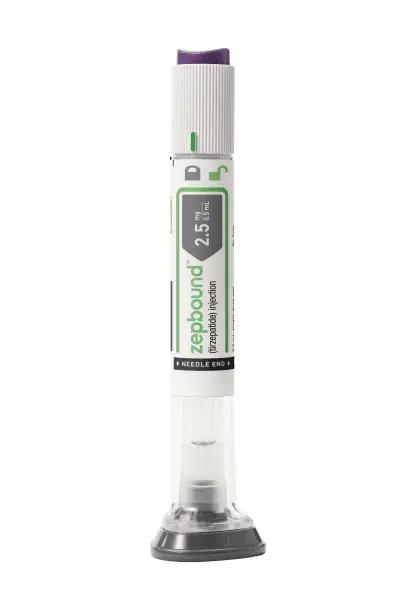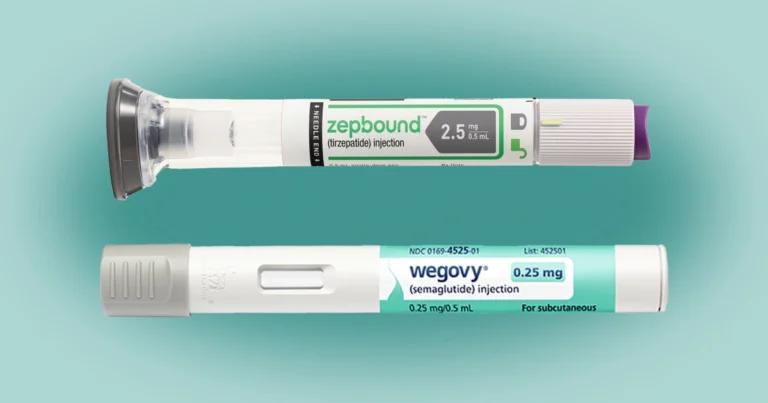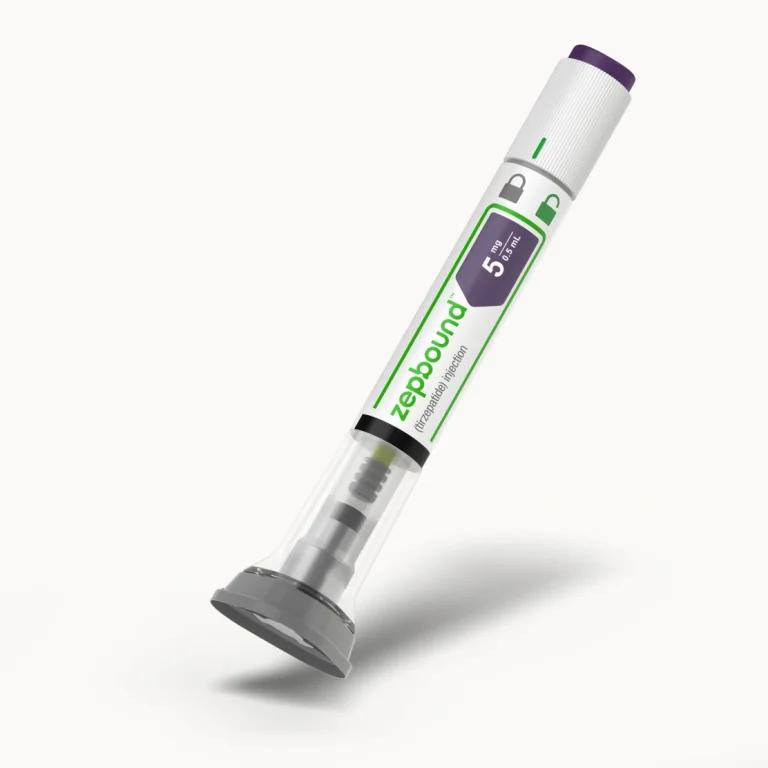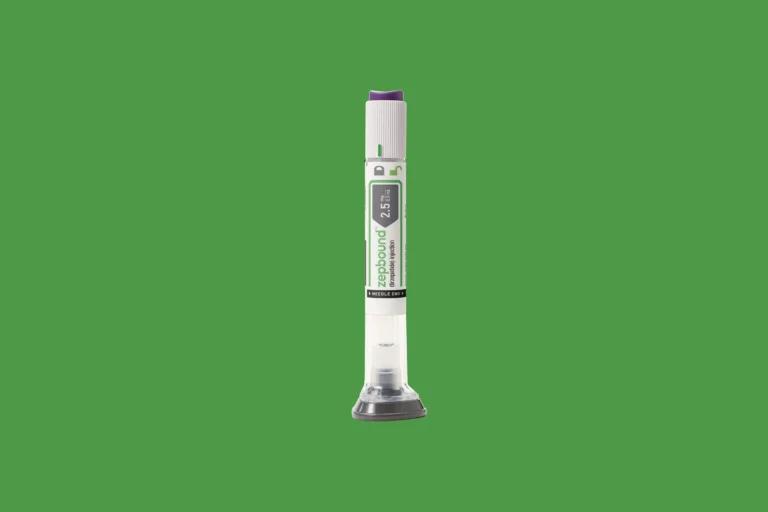In the landscape of weight management, Zepbound and Wegovy have emerged as significant players. These weight loss drugs known respectively as the brand names for tirzepatide and semaglutide, have captured the interest of healthcare professionals and patients alike, heralding a new era in chronic weight management.
Given their shared class of incretin mimetics and similar side-effect profiles, a thorough exploration of the side effects associated with Zepbound versus Wegovy is crucial. This article delves into the details of these medications, shedding light on their potential impacts and considerations for those seeking treatment options.
Overview of Zepbound
Zepbound manufactured by Eli Lilly is a relatively new entrant in the weight management pharmaceutical market, offering hope for adults grappling with obesity or excess weight and related health issues. Here’s a closer look at what Zepbound entails:
Composition and usage:
- Contains the active ingredient tirzepatide, a dual-agonist that targets both GLP-1 and GIP receptors
- Designed for once-weekly injectable use, it simplifies the regimen for patients
- Not to be combined with other tirzepatide-containing products or GLP-1 receptor agonist medicines
Dosage and administration:
- Initial dosage starts at 2.5 mg once per week, with increments to 5 mg after the first month
- Dosage can be increased based on individual response and tolerance, up to a maximum of 15 mg weekly
- Accompanying lifestyle changes such as a reduced-calorie diet and increased physical activity are recommended for optimal results
Clinical trial outcomes:
- In a 17-month clinical study, participants experienced sustained weight loss when combining Zepbound with diet and exercise
- The average weight loss varied, with non-diabetic adults losing up to 20.9% (48 lbs) at the highest dose
- Diabetic patients also saw significant weight loss, shedding an average of 14.7% (33 lbs) at the 15 mg dosage
- As the first FDA-approved combination peptide for obesity, Zepbound’s clinical success has been notable, with some participants losing as much as 21% of their body weight
Zepbound’s mechanism of action involves reducing appetite and decelerating digestion, which contributes to a feeling of fullness sooner and for an extended period. Its unique position as a dual-agonist drug sets it apart from other medications like Wegovy and Ozempic, which are single-agonist drugs. This distinction may play a role in the effectiveness and side effect profile of Zepbound, which are crucial for patients and healthcare providers to consider.
Zepbound side effects
Understanding the side effects of Zepbound is essential for individuals considering this medication for weight management. The side effects can range from common and mild to serious and potentially life-threatening.
Common side effects:
- Gastrointestinal issues: Patients may experience nausea, vomiting, diarrhea, constipation, abdominal pain, and indigestion
- General discomfort: Fatigue, hair loss, and dizziness are also reported, along with reactions at the injection site such as bruising, itching, and skin rashes
- Mild allergic reactions: Some individuals may encounter bloating, gas, burping, and mild allergic reactions
Serious side effects:
- Digestive system: Severe digestive side effects, including acute kidney injury and gallbladder disease can occur
- Pancreatitis: There is a risk of acute pancreatitis, a serious inflammation of the pancreas
- Endocrine concerns: Low blood sugar levels, especially when used with other medications that lower blood sugar, and risk of thyroid cancer are significant concerns
- Mental health: Depression and suicidal thoughts or behaviors are serious side effects that require immediate medical attention
- Allergic reactions: Severe allergic reactions may manifest as skin rashes, itchiness, and swelling
FDA boxed warning and precautions:
- Thyroid cancer: Zepbound comes with an FDA-boxed warning for the risk of thyroid cancer, the most stringent warning by the agency
- Contraindications: It may not be suitable for individuals with certain health conditions, or for those who are pregnant or breastfeeding
- Interactions: Zepbound can interact with several medications, including birth control pills, insulins, sulfonylureas, and warfarin, potentially diminishing their effectiveness or causing additional side effects
Patients are advised to discuss any symptoms of thyroid cancer and kidney problems with their healthcare provider. For severe allergic reactions, immediate medical assistance is necessary. Any serious side effects should be promptly communicated to a doctor. Side effects of Zepbound are similar to those of Wegovy, including digestive side effects and a boxed warning for thyroid cancer risk. However, long-term side effects were not reported in Zepbound studies. Individuals should report any side effects to the FDA at 1-800-FDA-1088 or through their MedWatch service.
Overview of Wegovy
Wegovy, known generically as semaglutide, stands as a prescription medication designed for adults battling obesity or excess weight complications. Here is a detailed overview:
- Indications: Approved for adults with a body mass index (BMI) of 30 or higher (obesity), or 27 or higher (overweight) who also have weight-related medical problems. Wegovy is to be used alongside a reduced-calorie meal plan and increased physical activity
- Mechanism of action: Mimics a hormone that regulates blood sugar, insulin levels, and digestion, contributing to feelings of fullness. As a GLP-1 receptor agonist, Wegovy targets brain areas that control appetite, aiding in weight management
- Dosage and Administration: Administered via subcutaneous injection once a week. The dosage is gradually increased over 16 to 20 weeks to help minimize gastrointestinal side effects. Clinical trials have highlighted Wegovy’s effectiveness in weight loss when compared to a placebo
- Efficacy: Adults using Wegovy in clinical trials experienced significant weight loss over those not using the medication. It is the first drug approved for chronic weight management in adults since 2014
- Considerations: Not recommended for patients with a history of specific thyroid cancers or Multiple Endocrine Neoplasia syndrome type 2. Patients should discuss all health conditions and medications with their healthcare provider to ensure Wegovy is safe for them
Wegovy’s approval by Novo Nordisk marks a significant milestone in weight management options for patients. While the cost may be a barrier for some, the medication’s ability to mimic the GLP-1 hormone and effectively signal satiety in the brain positions it as a potent tool in the fight against obesity and its related health conditions. As with any prescription medication, patients need to report any negative side effects to the FDA, to ensure safety and efficacy for all users.
Wegovy side effects
When considering Wegovy for weight management, it is important to be aware of the potential side effects. These side effects can vary from mild to severe, and understanding them can help individuals and healthcare providers make informed treatment decisions.
Serious side effects:
- Thyroid cancer risk: Wegovy has a boxed warning for thyroid C-cell tumors, including the risk of medullary thyroid carcinoma (MTC), a type of thyroid cancer. It is not recommended for use in individuals with a personal or family history of MTC or Multiple Endocrine Neoplasia syndrome type 2 (MEN 2)
- Pancreatitis: There is a risk of acute pancreatitis, which can be fatal or lead to serious complications like hemorrhagic or necrotizing pancreatitis. Patients should be educated about the signs and symptoms of pancreatitis
- Gallbladder issues: An increased occurrence of cholelithiasis and cholecystitis has been noted, with gallstones reported in 1.6% of users in clinical studies
- Hypoglycemia: Wegovy lowers blood sugar levels and can lead to hypoglycemia. Patients, especially those with type 2 diabetes, should be informed about the risks and symptoms of low blood sugar
- Kidney injury: Postmarketing reports indicate acute kidney injury and worsening of chronic renal failure in some patients treated with semaglutide
- Hypersensitivity reactions: Serious allergic reactions, including anaphylaxis and angioedema, have been reported with Wegovy use
- Diabetic retinopathy: Rapid improvement in glucose control has been associated with a temporary worsening of diabetic retinopathy. Regular eye exams are recommended for those with a history of this condition
- Increased heart rate: Clinical trials observed mean increases in resting heart rate of 1 to 4 beats per minute
- Mental health concerns: Monitoring for depression, suicidal thoughts, or behaviors is necessary, and Wegovy should be discontinued in patients who experience such symptoms
Common side effects:
- Gastrointestinal issues: These include nausea, diarrhea, vomiting, constipation, and abdominal pain, which are common across GLP-1 receptor agonists
- General discomfort: Patients may experience headaches, fatigue, dizziness, indigestion, bloating, belching, gas, stomach flu, and gastroesophageal reflux disease
- Respiratory symptoms: Some individuals may encounter a runny nose or sore throat
Patients must report any side effects to their healthcare provider. The information provided here is not exhaustive, and patients should consult their healthcare provider for a complete list of potential side effects and advice tailored to their specific health situation.
Comparative analysis
When evaluating Zepbound and Wegovy for weight loss, several key factors emerge from clinical trials and their pharmacological profiles. Here’s a comparative analysis based on the provided factual key points:
- Mechanism of action: Zepbound operates as a dual-agonist, impacting GLP-1 and GIP hormone pathways, potentially offering a broader metabolic response. Wegovy, in contrast, is a single-agonist drug, focusing solely on the GLP-1 pathway, which is well-known for its role in appetite regulation and insulin secretion
- Efficacy in weight loss: Clinical trials have shown that Zepbound users, especially those without diabetes, can experience significant weight loss, with an average loss of 18% at the highest dose. Diabetic patients on Zepbound also benefit, with an average weight reduction of 12%. In comparison, while Wegovy has proven effective, the weight loss percentage for Zepbound users is notably higher, with some losing up to 21% of their body weight
- Cost and accessibility: Both medications are on the higher end of the cost spectrum, with Zepbound ranging from approximately $950 to $1,300 monthly and Wegovy from about $1,300 to $1,500 monthly, without insurance. Availability is a consideration; Wegovy is currently more accessible, which may influence a patient’s decision based on the immediacy of obtaining the medication. Insurance coverage and individual response to the medication are crucial factors that can sway the decision between the two options
Both Zepbound and Wegovy should be incorporated into a comprehensive weight management plan that includes a balanced diet and regular physical activity. The decision to choose one over the other will depend on individual factors such as the degree of weight loss desired, cost considerations, and how quickly the patient needs access to the medication. Healthcare providers and patients need to discuss these aspects to determine the most suitable option for their specific needs.
Conclusion
Through a meticulous comparison of Zepbound and Wegovy, we have examined the implications of their usage for individuals striving for effective weight management. Both medications, each with its unique set of benefits and side effects, offer promising avenues for those facing weight-related health challenges. The thoughtful deliberation of their mechanisms, efficacy, and patient-specific considerations, such as cost and accessibility, is critical for making an informed treatment choice.
As we embrace the advances in obesity treatment, patients and healthcare professionals must engage in open dialogue, weighing the potential risks against the transformative outcomes of both Zepbound and Wegovy.
Sources
- Weight-Loss Prescription Medication | Wegovy® (semaglutide) Injection 2.4 mg
- Zepbound (tirzepatide) Injection for Adults with Obesity or Excess Weight (lilly.com)
Medical Disclaimer
NowPatient has taken all reasonable steps to ensure that all material is factually accurate, complete, and current. However, the knowledge and experience of a qualified healthcare professional should always be sought after instead of using the information on this page. Before taking any drug, you should always speak to your doctor or another qualified healthcare provider.
The information provided here about medications is subject to change and is not meant to include all uses, precautions, warnings, directions, drug interactions, allergic reactions, or negative effects. The absence of warnings or other information for a particular medication does not imply that the medication or medication combination is appropriate for all patients or for all possible purposes.
Related Articles
What distinguishes Zepbound from semaglutide in terms of effectiveness?
Zepbound may be more appropriate for certain individuals due to its dual functionality in aiding weight loss and managing related conditions like high cholesterol or type 2 diabetes. However, semaglutide, also known as Wegovy, might be more beneficial for others because of its distinct mode of action.
Can you list the potential adverse effects of Zepbound?
Zepbound users might experience a range of side effects, including nausea, diarrhea, vomiting, constipation, abdominal pain, indigestion, reactions at the injection site, fatigue, allergic reactions, belching, hair loss, and heartburn.
Is there a weight loss medication that outperforms Wegovy?
Zepbound, a recently approved drug for weight loss, has been suggested to potentially be more effective than Wegovy and could also contribute to reducing the cost of various weight loss medications.
How successful is Zepbound in promoting weight loss?
Clinical trials in phase three have demonstrated that tirzepatide, marketed as Mounjaro and Zepbound, led to a weight reduction of 20% or more after 72 weeks of treatment, in comparison to a placebo group.












